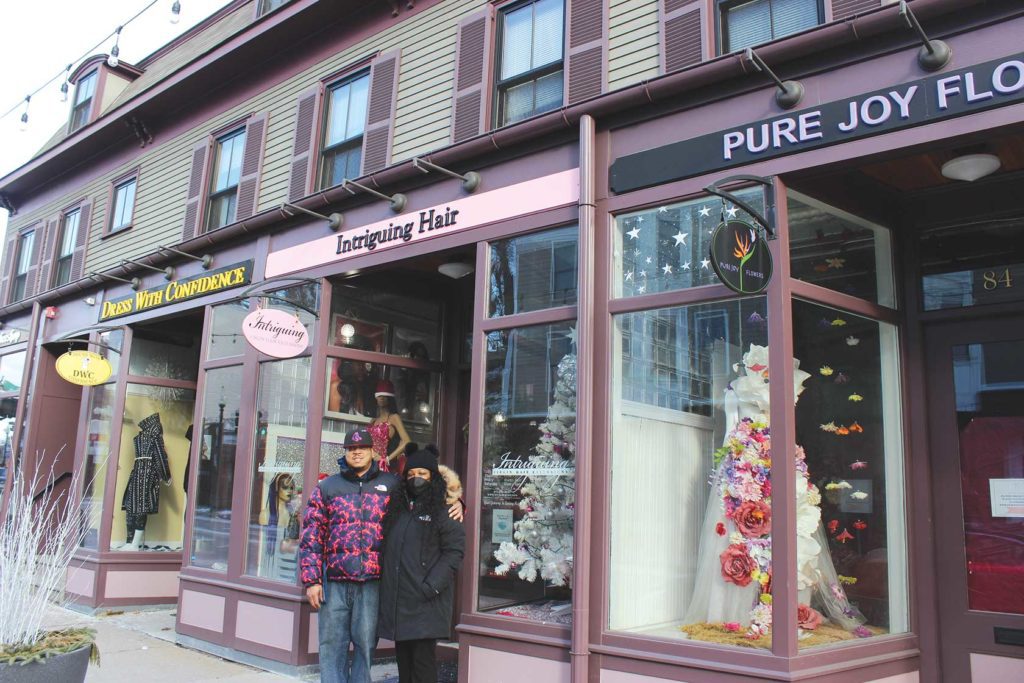
A Hyde Park couple is one step closer to making their financial dreams come true. A deal set to become final next month between the nonprofit Historic Boston Incorporated and business owners Nikia Londy and Baron Langston of Intriguing Hair will pass ownership of the recently restored Vertullo Building, in which the wig shop has conducted business for the last six years.
The building, located on Fairmount Avenue in Hyde Park, was purchased by Historic Boston Inc. in 2010 and restored from a semi-dilapidated state to a historically accurate version of its former glory, with room for five small-business spaces and four apartments. According to HBI, the Vertullo Building was built in 1868 and expanded around 1890. On its website, HBI claims it is “likely the oldest and only surviving wooden commercial building in the Cleary and Logan Squares commercial district.”
After conducting research into what the building may have looked like around 1890, HBI Executive Director Kathy Kottaridis said the organization turned its sights on how they could pair restoration with accommodating modern small businesses, including attracting foot traffic and new patrons. This was also the beginning of a new goal for HBI that has continued since the Vertullo was finished in 2015, she said.
“We had begun to think about how we could be more than just the ones that took care of the pristine, well-known historic buildings, and how we could help neighborhood commercial districts, which have some of the most historic buildings in each one of the neighborhoods,” Kottaridis said. “How we could use our skills in rejuvenating historic buildings to help in the revitalization of commercial districts.”
Kottaridis said that as part of the restoration and revitalization project, HBI not only added paint and decoration, but also made efforts to improve heat, water and HVAC systems.
Intriguing Hair, which started as a word-of-mouth business run out of the back of Londy’s car, has been a tenant of the Vertullo building since its reopening six years ago. Londy and her partner Baron Langston said from the day they moved in they knew they wanted to be more than just tenants.
“In the city of Boston, we know real estate is just constantly going up. There’s no stopping it. I said, this might be the only opportunity, if a miracle happens when I’m able to purchase this building,” Langston said. “I said to the owner, ‘Whenever you sell this building, let me know because I want to buy this building.’ And they laughed. So years go by … I just kept saying, I want to buy this building.”
The couple, who have one son at home, said they’ve made it a goal to buy property in order to give their child an asset and improve his quality of life.
“We’re just trying to create something to be able to give to our son,” said Langston, who added that during his childhood, his family struggled under the pressures of poverty, including putting food on the table and paying for heat.
“I want to eliminate those stresses for my son. And by doing this, you have something to hand down,” he said.
The racial wealth gap in the city of Boston has continued to be on full display in the wake of the coronavirus pandemic, with Black residents being disproportionately left out of business ownership and home ownership, in turn putting future generations of Black Bostonians at a disadvantage.
Londy and Langston said the community has been vital for them to be able to purchase the building and attempt to interrupt this cycle. Several community advocacy groups and financial institutions, including the Southwest Boston Community Development Corporation, MassDevelopment, the Black Economic Council of Massachusetts (BECMA), and elected officials such as Ayanna Pressley and Michelle Wu, came together to help the couple achieve their goal.
“They all definitely tried to see what they could do, to make sure that we bought the building,” Londy said.
Nicole Obi, the newly minted president and CEO of BECMA, said, “I think that this represents not just an opportunity for the owners of Intriguing Hair, but it represents opportunity which is very powerful. I think that this investment in this community is going to pay dividends not just to the owners, but for the broader community as well. I think it’s a paragon of self-sufficiency, and that is important to help to close the racial wealth gap.”
The interest from advocates and elected officials helped strike a deal with HBI to buy the building for the price it was bought for originally plus the value of the improvements — just over $1.3 million. To make the deal even affordable for Londy and Langston, the building is under an easement that will allow them to receive tax benefits in exchange for “preserving certain aspects of the exterior of their buildings into perpetuity.”
Kottaridis said she believes this requirement won’t burden the new owners, who have continued to be stewards since first moving in.
“They’ve been point people on the building,” she said. “They’ve built relationships with the other tenants. If something is going on in the building, like there’s a heating issue or there’s a water issue or whatever, Baron in particular would be in touch with us or the property manager.”
Kottaridis continued, “So they’ve obviously shown a lot of care and interest in the building itself. I think that that naturally is going to translate into good ownership.”






